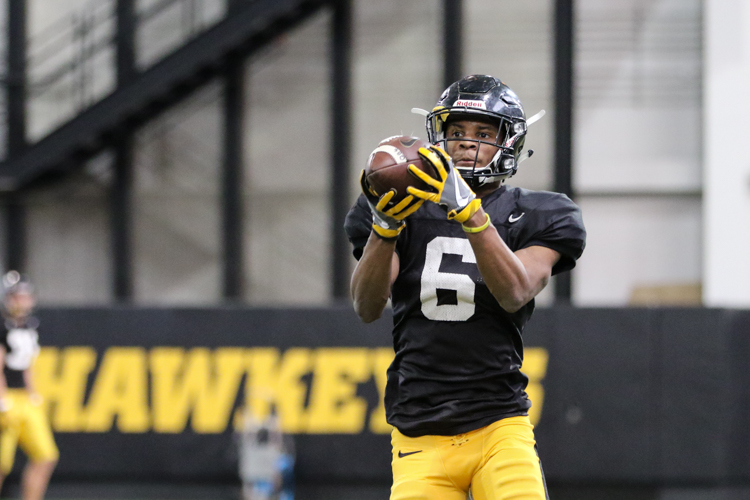Iowa football has a rare combination of speed at two critical positions on offense
By Pat Harty
IOWA CITY, Iowa – A lack of speed at wide receiver has plagued the Iowa football team during much of Kirk Ferentz’s nearly two-decade-long run as head coach.
Ihmir-Smith-Marsette can’t change that by himself, but the sophomore from Newark, N.J., truly is the exception to the rule when it comes to speed.
It is hard to think of another Iowa receiver under Ferentz who could match Smith-Marsette’s pure speed.
You might have to go all the back to fellow New Jersey native James Townsend, who left the Iowa program after the 2004 season and then finished his career at Rutgers.
Townsend was also an exception to the speed rule as Iowa fans saw when he caught a 60-yard touchdown pass from Drew Tate in a victory at Minnesota in 2004. Townsend blew past the Minnesota secondary and didn’t have to break stride as Tate placed the ball perfectly.
Unfortunately for Hawkeye fans, that catch would account for more than half of Townsend’s productivity as he combined for just six catches and 98 receiving yards over two seasons at Iowa.
Townsend’s speed had been well publicized during the recruiting process, but his touchdown at Minnesota was the only time it impacted a game for Iowa.
Townsend struggled to find consistent playing time, proving that it takes more than blazing speed to be a successful college receiver.
Smith-Marsette also learned last season that it take more than speed to excel at the Big Ten level, but he still seems to have caught on quicker than Townsend did.
Smith-Marsette had 18 catches for 187 yards and two touchdown last season, including the game-winner at Iowa State in overtime.
He also returned a kick 74 yards to start the third quarter at Nebraska.
Smith-Marsette’s biggest problem last season was a lack of consistency, which included several costly drops.
First-year players often struggle with consistency, so the hope is that Smith-Marsette will improve in that area and have more opportunities to exploit defenses with his speed, both as a receiver and as a return specialist.
“Ihmir Smith-Marsette has to come through for them,” former Iowa All-America quarterback Chuck Long said Thursday. “They need that consistent and reliable deep threat.”
Speed on tape from high school doesn’t always carry to the field in college, but it sure did with Smith-Marsette.
“You watch them and you think one thing about them when you’re watching high school film, and they get here and it’s not quite the same,’ said Iowa special teams coach LeVar Woods. “And Ihmir is a guy that I think his high school film, we liked him last year, but then all of the sudden he gets here and you realize how fast he truly is.
“It’s kind of like Noah Fant. I recruited Noah and went to watch him play a game and he was fast. But I didn’t realize he was quite that fast until he gets here. He runs by you.”
Noah Fant’s speed has helped him become an emerging star as an Iowa tight end. He led the team with 11 touchdown catches last season as a sophomore, and that was the most for an Iowa tight end for a single season.
So combine Fant with Smith-Marsette and Iowa has a rare combination of speed at two critical offensive skill positions, along with strong-armed quarterback Nate Stanley, who threw 26 touchdown passes and just six interceptions last season.
The challenge for second-year offensive coordinator Brian Ferentz is to devise ways to most effectively use that speed.
“I think the whole thing is built really when you look at it, we need to have speed on the outside because as an offense, I don’t care how you play, if you can’t threaten the defense vertically down field, you’re going to have issues,” Brian Ferentz said. “And the easiest way to do that just because of how structures work is to do it on the perimeter as far away you can get from the safeties, whether it’s cover two or cover, one, you have to have perimeter speed.
“I do feel like we’re making some progress. We have gotten some guys on the outside that can really run and threaten the defense.”
Other than Kevin Kasper and C.J. Jones at the beginning of Kirk Ferentz’s run, Derrell Johnson-Koulianos in the middle and Tevaun Smith more recently, Iowa has relied mostly on receivers with average to slightly above average speed to fill a position where speed and quickness are crucial to having success
Marvin McNutt is Iowa’s all-time leading receiver with 2,861 receiving yards, but he hardly was a blazer. McNutt had good speed, including running the 40-yard dash in 4.54 seconds, but he excelled more by using his size, his strength, his instincts and his ability to catch just about everything that was thrown his way.
Imagine if Smith-Marsette could develop some of those same qualities with his speed.
“He does have elite speed and that’s a thing you can’t teach, you can’t coach,” Woods said. “As much as you want to or try to, you can’t. And that’s what he gives you.”



